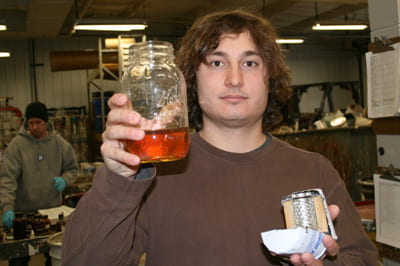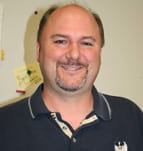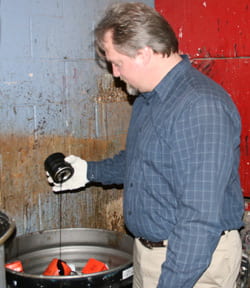Changing the law: Student helps close oily landfill loophole
 A new state law banning used oil filters and absorbent materials from landfill disposal could prevent nearly a million gallons of used oil getting into Wisconsin landfills.
A new state law banning used oil filters and absorbent materials from landfill disposal could prevent nearly a million gallons of used oil getting into Wisconsin landfills.
It’s an example of environmental legislation that received a boost from the practical problem-solving of UW-Green Bay Associate Prof. John Katers (Natural and Applied Sciences), and graduate student Adam Snippen (photo above).
Late last year Gov. Jim Doyle signed Assembly Bill 256, legislation that prohibits disposal of used oil filters in landfills. The law goes into effect on December 10, 2010.
State recycling law already prohibited the disposal into landfills of steel, paper and oil. However, the law never directly addressed used oil filters.

Prof. John Katers
Katers and Snippen point out that this isn’t merely a semantic matter.
Used oil filters are made of steel and paper, while also containing a significant amount of oil if they have not been properly hot drained. As long as the oil isn’t literally dripping from a filter, it wasn’t subject to the prohibition. That same standard applied to absorbent materials.
In 2005 the Wisconsin Department of Commerce formed a task force to review this matter and issued a report that calculated that a significant amount of oil was getting into landfills. At the time no action was taken, but businesses were encouraged to look at alternative measures, with the understanding that if progress didn’t occur on oil filter recycling rates, stronger measures would be considered.
Two years ago Snippen, a Schofield native and Environmental Science major who is now a graduate student, revisited that original report and recalculated how much waste oil may be going into state landfills as part of his work with the UW-Extension Solid and Hazardous Waste Education Center.
Not only did Snippen gather the data, he was called upon to testify about his findings before the Assembly Committee on Natural Resources. Like most issues that come before the legislature, there was testimony in support and opposition.
“I like getting turned loose on a subject and having to problem solve,” said Snippen, who is also a previous recipient of the Paul and Thea Sager Scholarship at UW-Green Bay, which recognizes outstanding scientific research by an undergraduate student. “I took a look at high and low estimates and found that on the high end there could be up to a million gallons of oil getting into landfills.”

Wess Damro, Brown County Solid Waste Department
Used oil filters are already being collected at the Material Recovery Facility on South Broadway in Ashwaubenon, said Wess Damro, Recycling/Hazardous Waste Manager for the Brown County Solid Waste Department.
“I think this closes a loophole, but enforcement could be a challenge,” Damro said.
The MRF is open noon to 6 p.m. on Thursdays, and 8 a.m. to 2 p.m. on Saturdays.
When Doyle signed the legislation, Toral Jha of the Associated Recyclers of Wisconsin offered succinct praise: “This bill ensures the safe recovery of these materials and creates increased opportunities for Wisconsin’s growing oil filter and used absorbent collection and processing industry.”
That point isn’t lost on Katers, who notes, “By creating regulatory or economic disincentives to landfill, you create business opportunities. Students who get the opportunity to work on SHWEC projects (Solid and Hazardous Waste Education Center projects) like this one really get an opportunity to see their efforts put to practical use. The most valuable skill we can teach them is problem solving, which ultimately benefits the general public and the companies these students will work for in the future.”





